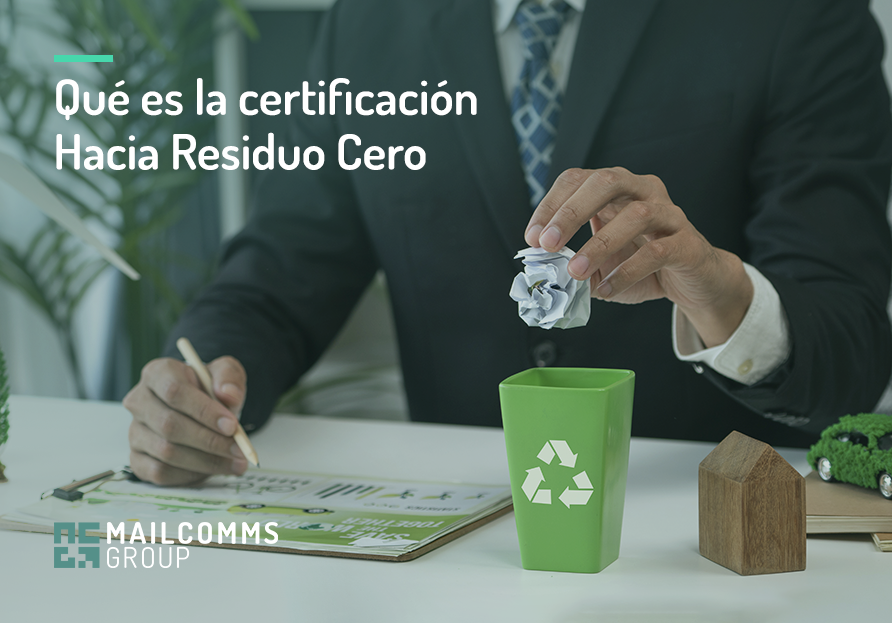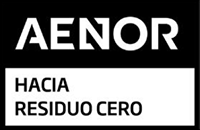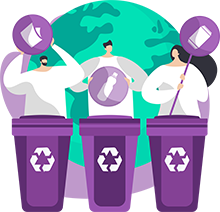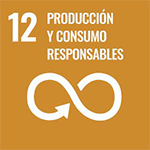
What is the Towards Zero Waste certification?
 Towards Zero Waste is a certification that, very briefly, can only be obtained by companies that reliably prove that they recover more than 60% of the waste they generate in their activity, according to the Aenor Regulation for its concession, and understanding recovery as established in the Waste Law 7/2022. According to this standard, “valorize” means to recycle or incinerate to produce energy, i.e. not to dispose of in a landfill, which contributes nothing to society or the planet. Quite the contrary.
Towards Zero Waste is a certification that, very briefly, can only be obtained by companies that reliably prove that they recover more than 60% of the waste they generate in their activity, according to the Aenor Regulation for its concession, and understanding recovery as established in the Waste Law 7/2022. According to this standard, “valorize” means to recycle or incinerate to produce energy, i.e. not to dispose of in a landfill, which contributes nothing to society or the planet. Quite the contrary.
The preposition “towards” is also not used gratuitously in the name of the certificate. It is the equivalent of “continuous improvement” and denotes the clear intention of the management to ensure that the highest percentage of waste has a useful life after its first use. In fact, when a company reaches 90% of its waste recovered, the qualification it obtains loses the preposition and becomes, directly, Zero Waste.
All of the above connects directly with the concept of circular economy, where circularity means giving a second life to materials. This extends the life of landfills, where waste ends up with no new opportunities for reuse, recycling or incineration, and whose facilities are extremely problematic.
Applicable regulations: new Waste Law 7/2022
 In Spain, the regulatory framework for waste management is defined by Law 7/2022 on Waste and Contaminated Soils for a Circular Economy. The regulation establishes the measures and instruments to be used by public administrations to achieve the state reduction targets, as well as obligations for companies.
In Spain, the regulatory framework for waste management is defined by Law 7/2022 on Waste and Contaminated Soils for a Circular Economy. The regulation establishes the measures and instruments to be used by public administrations to achieve the state reduction targets, as well as obligations for companies.
In its article 18, this law indicates the hierarchy in waste management: prevention comes first (avoiding generation), but if this is not possible, reuse and recycling will be prioritized over disposal in a landfill, which should only occur in cases where there is no other option.
Article 25, on the other hand, obliges companies to collect in a segregated and selective manner the usable waste fractions in order to promote recycling and reuse. This includes materials such as paper, metals, plastics and glass. The goal is for the product generated from the waste to be of sufficient quality to serve as raw material in other manufacturing processes.
Some outstanding concepts
There are some main ideas that should be reviewed in relation to this Towards Zero Waste certification.
Waste
As we have said, a waste is a material that is not suitable for other uses and has to be disposed of by the holder or owner. These materials arrive at the waste management plants from the industries and businesses that generate them, where they are treated according to their nature and degree of purity (uniformity and non-mixing between different types).. The main treatments are: preparation for subsequent recycling, direct recycling (e.g. aluminum from packaging), incineration for energy production or landfilling. which is, as we have already pointed out, the last of the options.
Landfills and their social and environmental problems
Landfills are controlled waste disposal sites with high operating costs, as they have to be managed efficiently throughout their life to prevent and control odors, vapors, accidental explosions, fires, and contamination of soils and aquifers.
By cost logic, these facilities have to be located close to the places where the waste is produced, i.e. the cities, since transporting the waste to the treatment facilities is usually the most expensive part. But this provokes strong social protest, which is also continuous, since the rate of waste generation is such that every few years the landfills are clogged and closed, with the consequent opening of new ones. To put a figure on it, in Spain 11 million tons of garbage end up every year. And this is unsustainable in the long term.
Circular economy
To achieve a full circular economy, the solution is to generate by-products and raw materials from waste, so that they are incorporated back into production processes and add value to the economy. This would also significantly reduce the environmental burden and public cost of landfill management, as well as the need to continually open new landfills.
Society is familiar with Ecoembes and Ecovidrio’s recycling of plastic, aluminum and glass containers and packaging, but there is an increasing amount of waste that can be used as raw material. In the printing industry, for example, this has been going on for decades.
Benefits of this certification
 The planet and society are the main beneficiaries of the Towards Zero Waste certification, as the good practices it obliges reduce pollution and have positive and measurable effects on SDGs such as SDG 12, Responsible production and consumption, and transversally on many others.
The planet and society are the main beneficiaries of the Towards Zero Waste certification, as the good practices it obliges reduce pollution and have positive and measurable effects on SDGs such as SDG 12, Responsible production and consumption, and transversally on many others.
For companies, Towards Zero Waste is a very important step forward in terms of sustainability and Corporate Social Responsibility. In addition, accreditation optimizes processes, reduces management costs and can even result in new revenues from recovered materials. Obtaining it also offers advantages in terms of business development, either to opt for projects that require it or to collaborate with companies for which the sustainable commitment of the suppliers with whom they work is a mandatory requirement.
